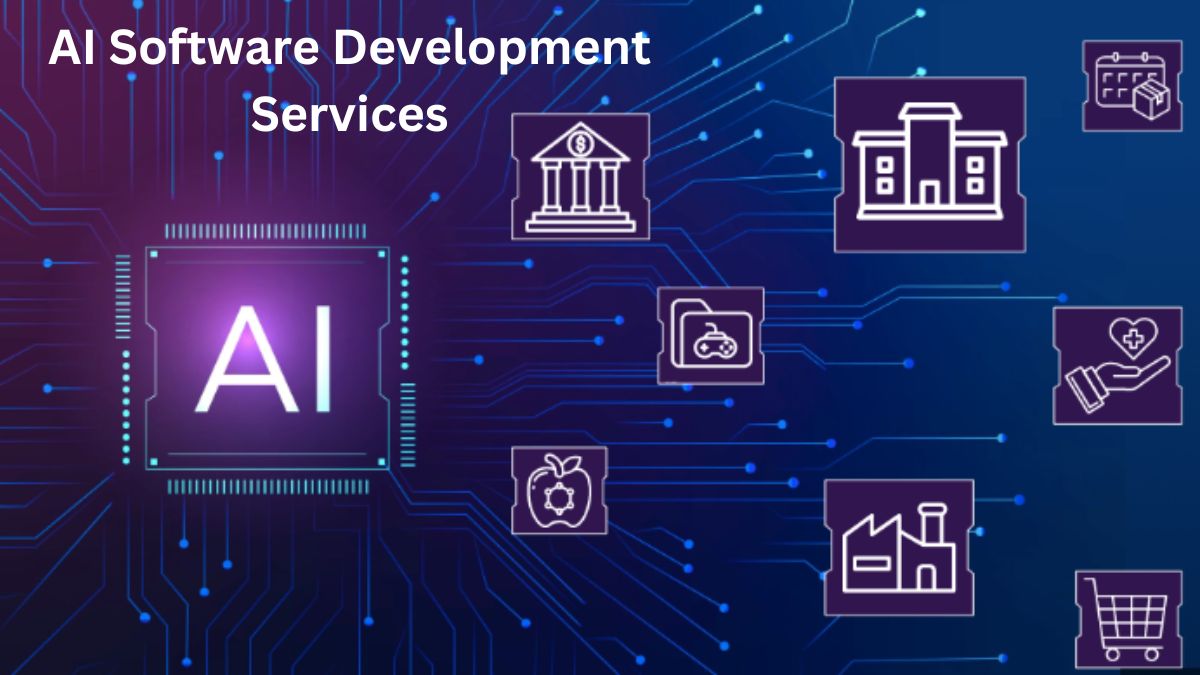Artificial intelligence (AI) completely transforms software development, transforming everything from automated code production to performance optimization and problem identification. It is revolutionizing AI software development services with its capacity to boost output, shorten development cycles, and raise code quality.
However, there are obstacles to this rapidly advancing field, including possible biases in algorithms and ethical issues.
What, then, is ahead for us? What effect will it have on the tech workforce? And how will experts continue to be relevant? Come along on an exciting adventure as we investigate the useful uses, advantages, drawbacks, and potential future developments of artificial intelligence in software development, which has undoubtedly made a name for itself in the software sector. And in the future, it will just grow its wings further.
The effects of AI on software development
Automation
Automation is one of the major effects of AI on software development. AI-powered solutions can automate time-consuming and repetitive processes like code analysis, debugging, and testing. Automation can result in more dependable and effective software solutions by shortening development cycles and lowering the possibility of human mistakes.
Here are a few instances of software development automation using artificial intelligence:
Automated Generation of Code
AI-powered tools use established templates, algorithms, and patterns to build entire programs or only small portions of code. These technologies generate new, syntactically, and semantically valid code by analyzing massive datasets of existing code using machine learning methods. This can help close the skill gap by enabling less experienced engineers to write complicated code, and it can also greatly accelerate the development process, particularly for repetitive jobs.
In addition to being useful for automated code testing. Machine learning may also be applied to improve the security of specific apps.
Natural language translating
Artificial intelligence (AI) has enabled the development of chatbots, virtual assistants, and voice-activated gadgets through natural language processing.
Software documentation can be automatically generated and optimized. With the help of AI-powered NLP technologies like ChatGPT. To provide precise and pertinent documentation for software libraries, APIs, and other technical resources, these tools can evaluate natural language queries, user reviews, and other information sources.
The capacity of these neural networks to mimic the human brain has only increased since the advent of deep learning, which is essentially a neural network with three layers or more. Recent years have seen tremendous advancements in NLP, which looks to be the core area of AI development.
Quality Assurance and Automated Testing
AI-powered technologies may simulate user interactions, create and test cases automatically, and perform other quality assurance duties. These tools build test cases that span a wide range of scenarios, identify possible problems, and learn from previous testing data through machine learning techniques. This can lower the possibility of releasing new problems, increase overall program reliability, and improve the quality of software releases. For instance, Applitools and Mabl are tools that employ AI to assess web apps visually.
Debugging
Software is another task that AI can automate. Debugging tools driven by artificial intelligence (AI) may examine code and spot any problems, enabling developers to swiftly address bugs and enhance the overall caliber of their product. Additionally, they can automatically produce patches or solutions for bugs that are found. Saving developers time and effort while troubleshooting and debugging. For instance, tools like Rookout and Undo use AI to provide real-time debugging capabilities.
Predictive Analytics and Data-Driven Development
AI can analyze sizable datasets of software development data, including those from code repositories, version control systems, and project management tools, to produce predictions and insights that can inform development decisions. AI can predict software errors and project development schedules, see trends in integrating successfully integrated code, and suggest the best development processes. Developers can use these insights to optimize their development processes and make data-driven decisions that will lead to better results.
Making decisions
AI’s influence on decision-making also has a noteworthy effect on software development. AI, for instance, can assist in finding trends in user behavior to enhance a software application’s user experience.
The following are some instances of how businesses and goods have profited from AI-driven decision-making:
- Netflix: To find trends and forecast what content customers will find enjoyable to watch, the firm examines user data. This has been crucial to the business’s success because it has allowed it to increase its user base and retain subscribers through tailored recommendations.
- Amazon: Amazon uses artificial intelligence (AI) to streamline its supply chain and make better judgments regarding inventory control. The corporation analyzes data from its transportation network and warehouses to find places where it can cut expenses and increase efficiency. As a result, the business has boosted profitability and streamlined operations.
- Salesforce: Salesforce leverages AI to assist sales teams in selecting which leads to follow up on with greater knowledge. The business’s Einstein AI engine examines data from various sources, such as social media and consumer interactions, to find the most promising leads. Sales teams have improved overall performance and closed more deals as a result of this.
- Google: Google employs artificial intelligence (AI) to determine which search results to show its users. The company’s algorithms determine the most pertinent results for a user’s query by analyzing many characteristics, such as content quality and user behavior. This has aided Google in continuing to be the most widely used search engine worldwide.
AI’s advantages for software development
Increased Output
Software development’s tedious and time-consuming operations, like testing, issue detection, code generation, and code review, can be automated with the use of AI-powered solutions. By doing this, developers can increase their productivity by freeing up more time to concentrate on more intricate and imaginative parts of software development.
Lower Expenses
Several ways integrating AI into software development processes might reduce costs. Artificial intelligence (AI) can save labor costs by automating repetitive processes that would otherwise take a lot of time and effort to complete by hand. Furthermore, by automatically identifying and resolving software flaws and vulnerabilities early in the development cycle, before they are introduced into production, AI can assist in lowering the expenses related to these issues. By doing this, businesses can avoid paying for after-the-fact bug repairs, security lapses, and client complaints.
Additionally, AI can assist companies in reducing the time-to-market for their software products, which may lead to an increase in revenue and market share, by streamlining development workflows and timeframes.
For example, a McKinsey study discovered that companies using AI in their development processes could save expenses associated with software development by 30–50% and development times by 20–30%.
Still, as we stated at the outset, things are not always easy. A few obstacles must be considered before making snap decisions and entrusting AI with determining the course of the future.
AI’s Challenges and Limitations
Ethical Issues
The ethical ramifications of utilizing AI in software development are one of the primary obstacles. It is possible for AI algorithms to produce code or make decisions that give rise to ethical questions about accountability, transparency, prejudice, and fairness. For instance, an AI-powered code review tool may inadvertently provide biased suggestions by favoring some coding styles or programming languages over others.
An AI-powered code-generating tool that unintentionally produces code with security flaws or breaches data privacy laws could be another example. In software development, ethical issues surrounding artificial intelligence must be carefully considered to guarantee that the technology is used responsibly and following ethical and legal standards.
Furthermore, there is a chance that AI systems will be abused, manipulated, or even attacked. In order to carry out such cyberattacks, tiny changes to the input data are introduced into AI models. Therefore, it is even more important to guarantee the stability and integrity of AI systems, particularly in emerging industries like cybersecurity, healthcare, and autonomous or self-driving cars.
Possibility of Bias in AI Systems
Since AI systems are trained on massive datasets. Biases may be unintentionally introduced if the training data is not representative or diverse. AI-powered software development tools may make biased recommendations or conclusions as a result. Strict data preprocessing, training, and validation procedures are needed to address bias in AI algorithms and ensure that the programs aren’t enhancing or reproducing preexisting prejudices.
Human Expertise Is Needed
Even though AI may automate a lot of monotonous software development chores, human knowledge is still necessary for critical thinking, creativity, and decision-making. Human intelligence is superior in subject knowledge, problem-solving abilities, and an awareness of business requirements—all of which are necessary for software development. Artificial intelligence (AI) cannot replace the experience, instinct, and judgment human developers bring.
An instance from real life that emphasizes the importance of human intelligence in software development is GitHub. “AI-generated code” experiment. GitHub published the results of an experiment in 2020 when they trained a language model to produce code. The generated code was intriguing and had promise, but it was unsuitable for production use and frequently had flaws, vulnerabilities, or went against best practices. This experiment demonstrated that human experience is still necessary for code review and validation in order to ensure the code’s quality, security, and compliance with coding standards, even though AI can provide code snippets or offer suggestions.
Additionally, cooperation, communication, and teamwork are all important human abilities that AI cannot simply replace in the software development industry.
In the AI phase, how can developers continue to be important?
Software development experts can implement the following actions to remain current in the AI era:
- Accept lifelong learning: This can involve learning new skills to interact with AI-powered tools efficiently. Keeping up with the most recent trends and advancements in AI and comprehending. How AI is applied in software development.
- Develop domain expertise: In the age of artificial intelligence, expanding one’s subject knowledge in software development can be quite beneficial. Experts can concentrate on learning particular programming languages, frameworks, or approaches and develop a thorough comprehension of design patterns, structures, and best practices for software development. Professionals can use this to offer insightful analysis and sound judgment to enhance the capabilities of AI-powered solutions.
- Stress, Critical Thinking, and Creativity: Although AI is capable of automating some jobs, human intellect is superior in these domains. Experts can develop their critical thinking, inventiveness, and problem-solving talents, which are crucial for more complex jobs requiring strategic judgment, system design, and problem-solving that go beyond AI’s capabilities.
- Remain Adaptive and Agile: Since the field of artificial intelligence is changing quickly, professionals must be able to adapt and change with the times. Keeping up with the newest trends and opportunities can involve being receptive to new technologies, approaches, and tools and actively participating in industry events, conferences, and communities.
- Encourage Collaboration with AI: Professionals should embrace AI as a tool to enhance their work rather than seeing it as a threat. Software development processes can be made more productive and efficient. By working together with AI-powered technologies. To improve outcomes, professionals can collaborate with AI-powered technologies, give feedback, and actively engage with them.
The Conclusion
It’s evident that AI is changing the software development landscape as we look to the future. So, let’s embrace AI’s promise, change and grow with the times, and keep innovating in the fascinating field of software development.
Governments, businesses, and academic institutions working together can open the door to responsible AI development services, guaranteeing that AI advances humankind rather than endangering it.
Even with its advanced development, artificial intelligence occasionally needs human assistance to maintain its efficacy. We need to learn to incorporate technology into our work paradigms to maximize our potential and increase our productivity rate, rather than fearing its onslaught. Experts say that since the First Industrial Revolution. There have been multiple paradigm shifts in the economy and labor force. People shouldn’t be alarmed that AI will replace them in their professions.






 United States
United States United Kingdom
United Kingdom India
India Canada
Canada Singapore
Singapore















![10 Benefits of the Internet of Things You Should Know [2025]](https://www.appstory.org/wp-content/uploads/2025/03/ATS-10-Benefits-of-the-Internet-of-Things-You-Should-Know-2025@2x-80x60.png)




















